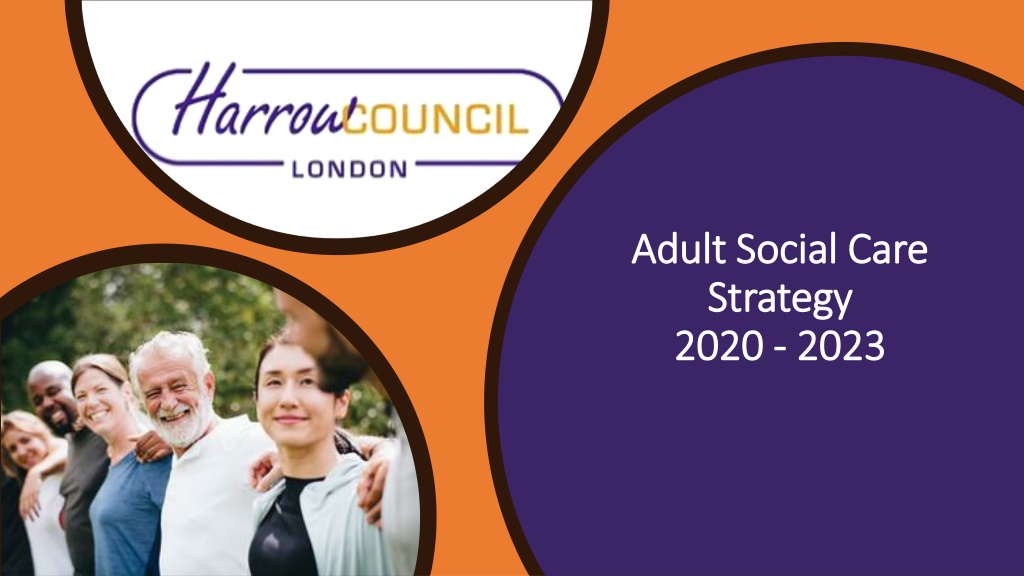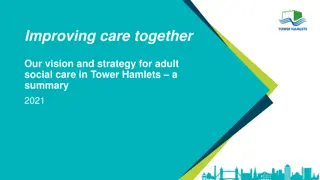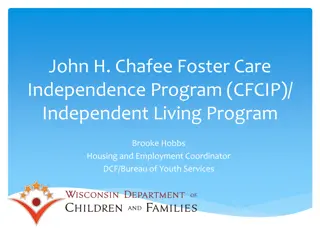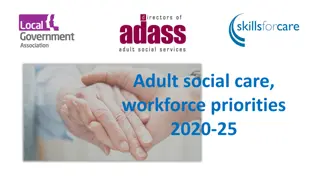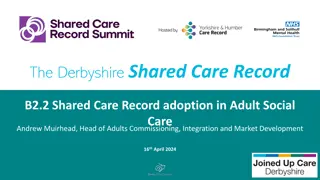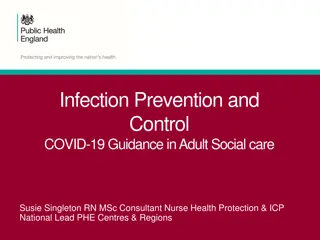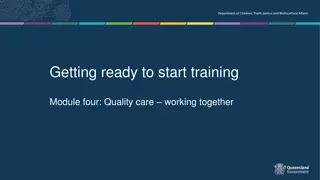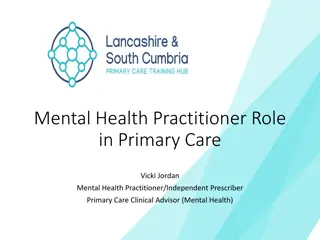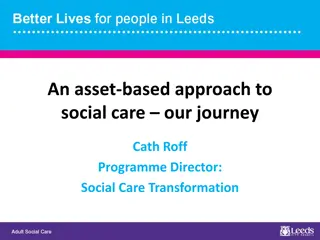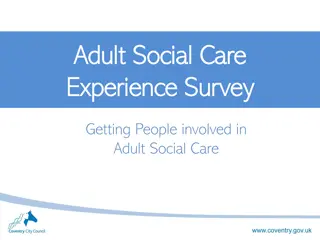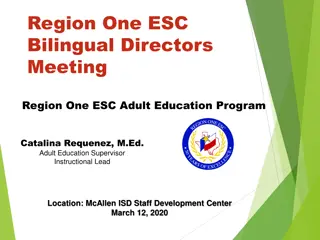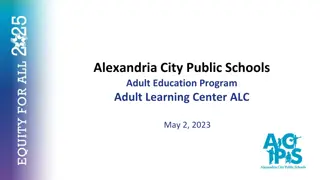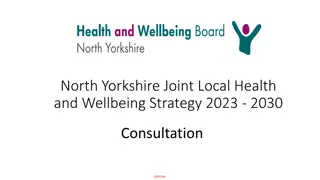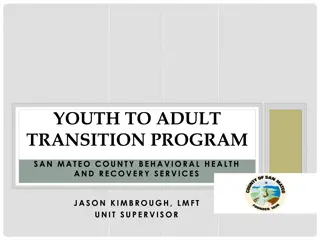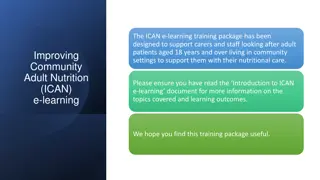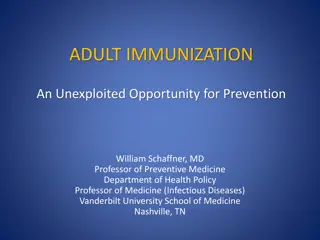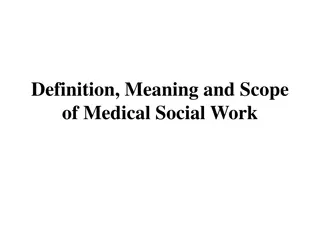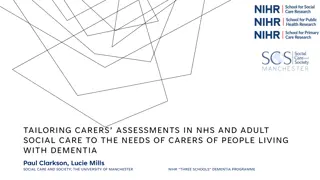Adult Social Care Strategy 2020-2023: Enhancing Community Support and Independence
Introducing the Adult Care Strategy for 2020-2023, focusing on maintaining individuals in their local community, providing support in their homes, and enhancing independence. The strategy emphasizes early intervention, skill-building, and safeguarding measures, particularly in the face of challenges like Covid-19. Collaboration with various partners, including Health and the Community Sector, ensures effective service delivery and continuous improvement based on user feedback. The Vision of "Harrow is Home" aims to keep citizens at home as long as possible, providing tailored support and empowering individuals and carers in decision-making and coordination of services.
Download Presentation

Please find below an Image/Link to download the presentation.
The content on the website is provided AS IS for your information and personal use only. It may not be sold, licensed, or shared on other websites without obtaining consent from the author. Download presentation by click this link. If you encounter any issues during the download, it is possible that the publisher has removed the file from their server.
E N D
Presentation Transcript
Adult Adult Social Care Social Care Strategy Strategy 2020 2020 - - 2023 2023
I am pleased to introduce this Adult Care Strategy for 2020 2023. We have set out a vision for Adult Social Care that focuses on our principles and values. Key to the future model, is to maintain people in their local community for as long as possible supporting them in their own home. Foreword Foreword from the from the Director of Director of Adult Social Adult Social Services. Services. Angela Morris Angela Morris We want to ensure that people receive the right kind of help at the right time. This means intervening early to support people and enabling them to learn new skills, maintain or regain their independence and prevent breakdown of caring arrangements by supporting family/unpaid carers. We have particular challenges because of Covid 19 and we want to ensure that we maintain services to the most vulnerable, and that we continue to safeguard people from harm. We work closely with many partners, including Health, the Voluntary and Community Sector and a whole range of providers and groups to help us deliver this strategy. Finally we need to ensure that we deliver good, cost-effective services and continue to improve services by listening to feedback from citizens and their carers and ensuring that they remain at the centre of what we do
The Strategy is a way of helping to create a change in approach: we want to ensure that citizens receive the right support at the right time to enable them to achieve maximum independence, choice and control. This includes giving good information, early intervention, enablement or reablement and preventative services. The Strategy allows us to plan together, with a range of partners, the voluntary and community sectors and the wider community to help ensure that we provide the right kind of help. Why do we need a Why do we need a Strategy for Strategy for Adult Social Care? Adult Social Care? The Strategy explains how we want to improve the way we all work together, building on the strengths of citizens and their carers,
Our Vision Harrow is Home: building a stronger community Our vision is a Home First philosophy to support and keep people at home for as long as possible. We want to ensure that citizens, carers and families who need help receive the right kind of response, whether that is to provide information and advice, to signpost to other community services or to intervene early to support citizens and carers for a period of time, during recovery, or to support independence and autonomy and for citizens and carers to have an equal voice in co- ordinating their support.
To put citizens at the centre of what we do (nothing about me without me). To help people remain at home for as long as possible and support people to be as independent and autonomous as possible in line with individuals aspirations What are the What are the priorities for our priorities for our Strategy? Strategy? To protect adults at risk To continually strive to improve services
Principles of Adult Social Care Principles of Adult Social Care We provide support that is tailored to the person so they can achieve the things that matter most to them. Assessments will be strengths based and look to achieve the outcomes that the individual desires to focus on. PERSON CENTRED CARE AND SUPPORT Working with people to help them stay safe, including the risks of harm, abuse or neglect. This is central in everything we do. We also want to support people with positive risk taking as an informed choice. SUPPORTING PEOPLE TO BE SAFE Throughout a person s care journey we will ensure that citizens and carers jointly design their support in a way that encourages them to do as much for themselves as possible, including taking responsibility for their own health and wellbeing and working with family members and carers SHARED RESPONSIBILITY
Principles of Adult Social Care contd Principles of Adult Social Care cont d We work with our partners to provide information, advice and support to prevent problems getting worse. We aim to prevent, delay or reduce people s need for social care by helping citizens to maintain or improve their wellbeing and independence, or to cope better with conditions which are gradually getting worse PREVENTION We maintain and improve the quality of the support that people receive, so that people receive the right support at the right time in the right place. We make improvements to the ways that people access our services and the ways we design and provide support, involving experts by experience and feedback about people s lived experiences. QUALITY OF CARE We aim to provide support that is joined-up across organisations so that people do not experience duplication of services or delays in accessing support or fall between the gaps. Working together makes the most of the strengths of all our partners and organisations from the public, private, voluntary and community sectors, education, leisure and employment. INTEGRATION
Principles of Adult Social Care contd Principles of Adult Social Care cont d We answer to the people we provide support to, their carers and the whole community. We communicate clearly about our responsibilities and policies and we are honest and open about our performance BEING ACCOUNTABLE We make the most of the resources (money and our staff ) we have available to promote people s well-being by focusing on the outcomes they want to achieve, including by influencing other organisations and the community. We use information intelligently to plan services that achieve outcomes in the most cost-effective way. MAKING BEST USE OF RESOURCES We have had to adapt ways of working and supporting our citizens during the Covid 19 outbreak. This has brought both challenges and opportunities in the way we continue to deliver services and support people. We will continue to find ways of supporting people in our communities to ensure their safety, and the safety of our staff. BEING ADAPTABLE
Our greatest asset is our workforce. Delivering our strategy and vision depends on a strong and resilient adult social care workforce, both within the council and in the wider health and social care sector. We will continue to develop our workforce and make sure staff understand their role in delivering the vision and strategy and their contribution to our wider priorities. We will ensure that leadership is consistent, and that all our workforce has a set of shared goals. We will promote staff health and well-being. Staff will have the skills to put into practice a strengths-based approach at front-line and leadership levels. Training and development will make sure that staff use this approach in their day-to-day work, including reflecting on their professional experiences to improve the way they work. We have a Principal Social Worker who acts as the lead professional for social work, playing a defining role in relation to the practise, standards and skills development of committed professional social workers. Our Our Workforce Workforce
Service developments Service developments Planning for the next 3 years Planning for the next 3 years
What is the plan: What is expected: What is the timescale: To develop an Enablement model for Learning Disability Services This is an early intervention service that promotes independence and autonomy. It will support people to maximise their potential and achieve individual goals and ambitions. The model will be piloted for a period of 12 months, starting in October 2020. The service will be evaluated in 2021. Develop a Community Support service for all adult groups We are looking to develop the ways in which people can be supported in and by the community. An Outreach model has started. This will support people with opportunities for leisure, education, employment and wellbeing. We have started work already and the model will be developed over the next 18 months to the end of 2021 Carers are better supported in their caring role and have access to a range of support options. Enabling carers to reduce the emotional, social, financial and health impacts they face. Improve the approach and practice in relation to carer assessments and support planning. Support carers to stay well and look after themselves. Recognise the impact of caring. Carers experience improvements in their physical and mental health wellbeing A new Carers Strategy developed along with our partners and a dedicated carers lead will ensure that carers issues are represented more effectively.
What is the plan? What is expected? What is the timescale? Expand the strengths based approach to assessment and planning Work is already underway and the plan is to roll out this process across all our services at the point of referral. This means that more people receive help early, and can be supported to maintain their independence and not have to rely on traditional care packages as the only means of support. The model, known as 3 Conversations is already supporting people early and helping to keep people at home. This is being extended to help people in hospital return home rather than entering residential or nursing care. This will be developed over the next 6 months to early 2021 Assistive Technology We want to extend our offer of assistive technology, as a means of enabling people to be more independent. This includes using a range of equipment to support people to self-care, maintain contact with others to combat loneliness and isolation, and engage in new ways of communicating with others. New assistive technology is advancing quickly and we are enhancing our offer over the next 2 years.
What is the plan: What is expected: What is the timescale: Provision of additional Extra Care accommodation in the borough. To enable people who have care and support needs to remain living in the community in their own tenancy, in a purpose built building which facilitates varying levels of disability. Individuals who have care and support needs will be offered a person centre care package which supports them to maintain their independence and autonomy. Tenants will have access to carers 24 hours a day for any unplanned needs that may occur, thus there is reassurance that in an emergency help will be available should it be required. The building with have communal rooms available that tenants can access for a variety of social activities thus reducing social isolation and enhancing wellbeing Over the next 3 years with the first accommodation due to be completed in June 2021. A new model of care designed to improve adult community mental health services. Commencing September 2020. Better information It will be much easier for citizens to come back into services We will make it much clearer what care and support citizens are going to receive and for how long, to meet their needs. People will have faster access to services in the Hub and we plan to establish better links or signposting to third sector groups that can also provide help to people. (Mental Health Services are provided by North, Central, North and West London NHS Foundation Trust)
What is the plan: What is expected: What is the timescale: To ensure that all incoming work to the Safeguarding Adults team is formally raised as a concerns An increase in safeguarding concerns bringing the Harrow levels closer to the national average End March 2022 To work collaboratively with the Children s Safeguarding Board on the joint priorities: mental health, domestic abuse, and contextual safeguarding Case audits demonstrate growing awareness of these issues and a think whole family approach End March 2021 Integrated Care and Support Teams development Adult Social Care are committed to working within the integrated Care and Support teams through the Integrated Care Partnership to meet the needs of the local population. Commencing September 2020
